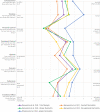Illness perceptions of adults with eczematous skin diseases: a systematic mixed studies review
- PMID: 33962662
- PMCID: PMC8106167
- DOI: 10.1186/s13643-021-01687-5
Illness perceptions of adults with eczematous skin diseases: a systematic mixed studies review
Abstract
Background: Eczematous skin diseases, e.g., atopic dermatitis or contact dermatitis, are associated with a high disease burden, a significant impact on quality of life and a higher risk for anxiety and depression. Therefore, coping strategies are of interest. In order to understand coping processes, it is necessary to examine the patients' perspectives on their illness. The aim of this systematic mixed studies review is to investigate the illness perceptions of patients with eczematous skin diseases to get a better understanding of their coping processes.
Methods: We performed a systematic literature search in PubMed, The Cochrane Library, PsycInfo, PSYNDEX, CINAHL, Web of Science, and Scopus until February 20, 2019. Both qualitative and quantitative studies were included in the review. Two independent reviewers conducted data extraction and carried out a narrative synthesis. We assessed study quality with the Mixed Methods Appraisal Tool.
Results: Three qualitative and four quantitative studies were included in the systematic review. We found different methodological approaches for investigating illness perceptions: guided interviews, focus group interviews as well as standardized questionnaires, e.g., the Brief Illness Perception Questionnaire. All studies report suspected causes of the skin disease, such as endogenous and exogenous causes (namely, psychological or occupational factors). We found long timeline beliefs as well as various perceived and experienced social, economic, and psychological consequences. Our analysis reveals complex emotional representations in patients with eczematous skin diseases, in particular impairment of emotional well-being, and feelings of shame or helplessness. Qualitative and quantitative data were predominantly complementary and convergent.
Conclusion: Patients with eczematous skin diseases have complex illness representations regarding their disease. These representations interrelate with the coping behavior of patients. Therefore, medical professionals should consider them for counseling and treatment.
Systematic review registration: PROSPERO 2018 CRD42018109217 .
Keywords: Atopic dermatitis; Contact dermatitis; Eczema; Illness perceptions; Self-regulation model; Systematic review.
Conflict of interest statement
The authors declare that they have no competing interests.
Figures





Similar articles
-
Promoting and supporting self-management for adults living in the community with physical chronic illness: A systematic review of the effectiveness and meaningfulness of the patient-practitioner encounter.JBI Libr Syst Rev. 2009;7(13):492-582. doi: 10.11124/01938924-200907130-00001. JBI Libr Syst Rev. 2009. PMID: 27819974
-
Illness perception and quality of life in patients with contact dermatitis.Contact Dermatitis. 2012 Oct;67(4):193-9. doi: 10.1111/j.1600-0536.2012.02071.x. Epub 2012 May 21. Contact Dermatitis. 2012. PMID: 22612452
-
Role of illness representations and coping in patients with atopic dermatitis: a cross-sectional study.J Eur Acad Dermatol Venereol. 2014 Nov;28(11):1566-71. doi: 10.1111/jdv.12301. Epub 2013 Oct 31. J Eur Acad Dermatol Venereol. 2014. PMID: 24171905
-
Behavioural modification interventions for medically unexplained symptoms in primary care: systematic reviews and economic evaluation.Health Technol Assess. 2020 Sep;24(46):1-490. doi: 10.3310/hta24460. Health Technol Assess. 2020. PMID: 32975190 Free PMC article.
-
Burden of Atopic Dermatitis in Adults and Adolescents: a Systematic Literature Review.Dermatol Ther (Heidelb). 2022 Dec;12(12):2653-2668. doi: 10.1007/s13555-022-00819-6. Epub 2022 Oct 5. Dermatol Ther (Heidelb). 2022. PMID: 36197589 Free PMC article. Review.
Cited by
-
Emotional Burden of Patients With Work-Related Hand Eczema: Results of an Exploratory Study in a Tertiary Individual Prevention Setting in Germany.Contact Dermatitis. 2025 Sep;93(3):243-251. doi: 10.1111/cod.14819. Epub 2025 Jun 1. Contact Dermatitis. 2025. PMID: 40452214 Free PMC article.
-
Serum level of interleukin-24 and its polymorphism in eczematic Iraqi patients.Medicine (Baltimore). 2024 Jun 21;103(25):e38635. doi: 10.1097/MD.0000000000038635. Medicine (Baltimore). 2024. PMID: 38905384 Free PMC article.
-
Illness Perceptions of Patients with Occupational Skin Diseases in a Healthcare Centre for Tertiary Prevention: A Cross-Sectional Study.Int J Environ Res Public Health. 2023 Apr 26;20(9):5652. doi: 10.3390/ijerph20095652. Int J Environ Res Public Health. 2023. PMID: 37174171 Free PMC article.
-
[Illness perceptions of patients with occupational hand eczema with respect to sociodemographic characteristics].Pravent Gesundh. 2023 Apr 29:1-12. doi: 10.1007/s11553-023-01039-2. Online ahead of print. Pravent Gesundh. 2023. PMID: 40479083 Free PMC article. German.
-
Quality of life in patients with allergic and immunologic skin diseases: in the eye of the beholder.Clin Mol Allergy. 2021 Dec 20;19(1):26. doi: 10.1186/s12948-021-00165-6. Clin Mol Allergy. 2021. PMID: 34930291 Free PMC article. Review.
References
-
- Wollenberg A, Oranje A, Deleuran M, Simon D, Szalai Z, Kunz B, Svensson A, Barbarot S, von Kobyletzki L, Taieb A, de Bruin-Weller M, Werfel T, Trzeciak M, Vestergard C, Ring J, Darsow U, the European Task Force on Atopic Dermatitis/EADV Eczema Task Force ETFAD/EADV Eczema task force 2015 position paper on diagnosis and treatment of atopic dermatitis in adult and paediatric patients. J Eur Acad Dermatol Venereol. 2016;30(5):729–747. doi: 10.1111/jdv.13599. - DOI - PubMed
-
- Ring J, Alomar A, Bieber T, Deleuran M, Fink-Wagner A, Gelmetti C, Gieler U, Lipozencic J, Luger T, Oranje AP, Schäfer T, Schwennesen T, Seidenari S, Simon D, Ständer S, Stingl G, Szalai S, Szepietowski JC, Taïeb A, Werfel T, Wollenberg A, Darsow U, European Dermatology Forum (EDF)., European Academy of Dermatology and Venereology (EADV)., European Federation of Allergy (EFA)., European Task Force on Atopic Dermatitis (ETFAD)., European Society of Pediatric Dermatology (ESPD)., Global Allergy and Asthma European Network (GA2LEN) Guidelines for treatment of atopic eczema (atopic dermatitis) part I. J Eur Acad Dermatol Venereol. 2012;26(8):1045–1060. doi: 10.1111/j.1468-3083.2012.04635.x. - DOI - PubMed
Publication types
MeSH terms
LinkOut - more resources
Full Text Sources
Other Literature Sources

